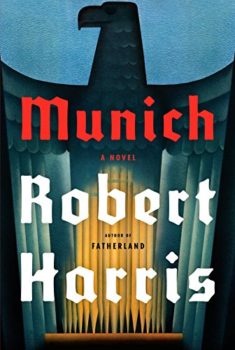
Mention Neville Chamberlain and Munich in the same breath today, and you’re likely to elicit a grimace. The agreement in 1938 between the British Prime Minister and Adolf Hitler to dismember Czechoslovakia was one of the most shameful and tragic events of the 20th century. But is it fair to condemn Chamberlain without understanding his motivation or the context of the times? The British thriller author Robert Harris has been exploring that question for thirty years. The result is his new novel, Munich. The book is not an alternative history like his popular novel, Fatherland. It’s fact-based historical fiction.
Why did Neville Chamberlain go to Munich?
As Harris paints the picture, Chamberlain’s actions in 1938 were not just understandable but possibly admirable. He was not naive about Hitler’s intentions. His rush to sign the pact with Nazi Germany responded to almost universal desire to avoid war, the difficulty of refuting Hitler’s logic about absorbing the Sudetenland Germans into the Reich, and Chamberlain’s passionate desire to avoid repeating the slaughter of World War I. (He had been too old to serve in the military then.)
Munich by Robert Harris (2018) 322 pages ★★★★☆
Harris based his novel on extensive reading about the Munich conference and the principal characters involved in it, which he details in a long bibliography in his Acknowledgements. Moreover, recent research suggests that if Britain and France had gone to war against Germany in 1938, the result would have been devastating. It’s true that the Nazi invasion of France and the Low Countries in May 1940 and the Battle of Britain that followed were disastrous for the Allies. However, the nearly two-year delay Chamberlain achieved at Munich allowed Britain to equip and staff the Royal Air Force just enough to stave off a German invasion of the island in September 1940. Harris implies that Chamberlain was fully conscious that war would come. He sought only to gain time.
An historical novel wrapped in a thriller
Harris builds his story around two central characters, one English, the other German. Hugh Legat is the most junior of Neville Chamberlain’s three Private Secretaries; he serves essentially as a gofer but is pressed into service at times as an interpreter and, even more rarely, as a wordsmith. Paul von Hartmann holds a similarly junior post in the German Foreign Ministry; he despises the Nazis and has joined a conspiracy to depose Hitler. The two young men had been classmates and friends at Oxford. They’d last seen each other in 1932 on a vacation in Germany.
Von Hartmann has secured a document that proves Hitler’s intention to expand Germany’s borders through war regardless of any international agreements. With the help of his collaborators in the anti-Nazi conspiracy, he travels from Berlin to Munich in hopes of delivering the document directly to Neville Chamberlain. Through their connections in London, the conspirators have contrived to arrange for Legat to be assigned to attend the conference, too. Von Hartmann expected Legat to help him get to Chamberlain. Harris builds a suspenseful story around the effort to arrange that.
Historical figures in a fictional setting
Legat and von Hartmann are both fictional characters. However, many of the other figures portrayed in Munich are based on real men. Prominent among them are British Foreign Secretary Lord Halifax and German Foreign Minister Joachim von Ribbentrop, as well as Chamberlain, Hitler, Mussolini, and French Premier Daladier. The author’s portrayal of these historical figures is solidly grounded in his research.
About the author
Robert Harris is one of the most successful writers in the world today. Most of his work is historical fiction about World War II and Ancient Rome. Beginning with Fatherland in 1992, his novels also include The Ghost (adapted to film as The Ghost Writer) and the three novels in the Cicero trilogy.
For related reading
You’ll find this book on The 40 best books of the decade from 2010-19.
I have previously reviewed several other novels by Robert Harris:
- Conspirata, the second book in his Ancient Rome Trilogy, reviewed at Conspirata by Robert Harris: Ancient Rome, before the fall
- The Fear Index, A taut thriller about the world of multibillion-dollar hedge funds
- An Officer and a Spy, The Dreyfus Affair, reenacted in a suspenseful spy novel
- Dictator, the third Ancient Rome novel, Cicero, witness to history
- Conclave, A thriller about Vatican politics
If you prefer to access all these reviews on a single page, go to The spellbinding thrillers of Robert Harris. Harris wrote five earlier novels in addition to the five listed here. I read and enjoyed them all before launching this blog in January 2010. They’re briefly summarized on that page.
My posts 10 top nonfiction books about World War II and The 10 best novels about World War II may interest you.
For other excellent historical novels, check out 20 most enlightening historical novels. And if you’re looking for exciting historical novels, check out Top 10 historical mysteries and thrillers reviewed here.
And you can always find my most popular reviews, and the most recent ones, on the Home Page.



























